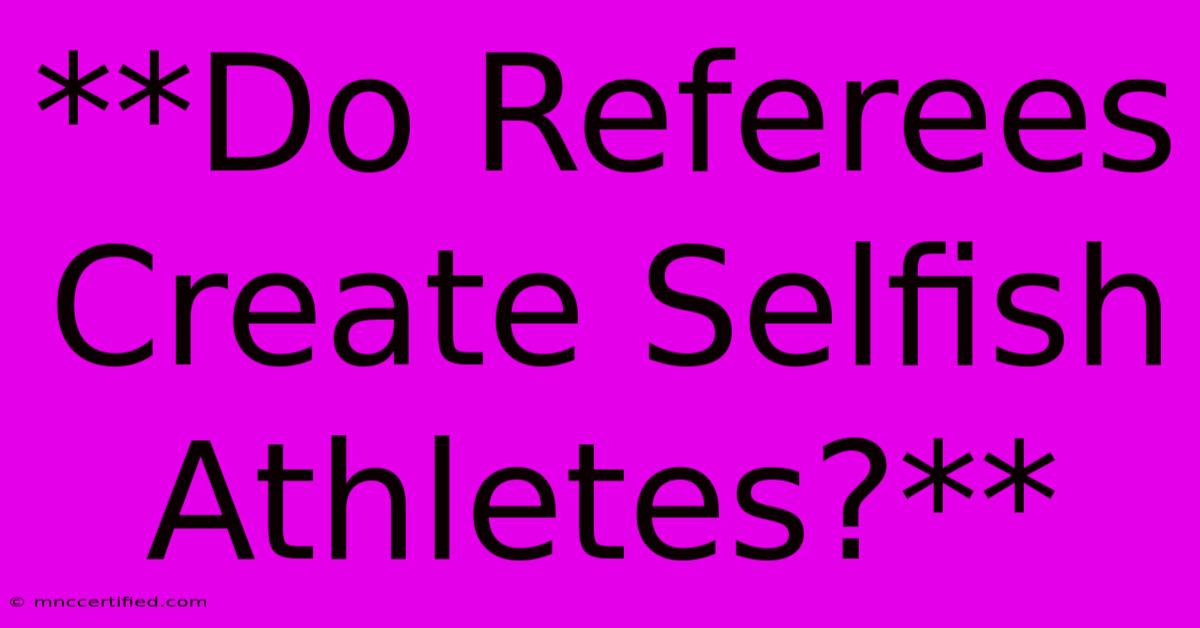**Do Referees Create Selfish Athletes?**

Table of Contents
Do Referees Create Selfish Athletes?
The debate surrounding the role of referees in shaping athlete behavior is a complex one. While referees are tasked with enforcing rules and ensuring fair play, some argue that their presence can inadvertently foster a culture of selfishness among athletes. This begs the question: Do referees truly contribute to the development of selfish athletes, or is there a more nuanced relationship at play?
The Argument for Selfishness
Proponents of this view argue that referees, by focusing on individual infractions and penalizing players for rule violations, can create a "me-first" mentality. This can lead to athletes prioritizing their own performance over the team's success, leading to a culture of individualism and selfishness.
For instance, players might focus on avoiding personal penalties, even if it means sacrificing a team play or acting against the spirit of the game. This can result in a lack of teamwork, communication, and overall sportsmanship.
The Counterargument: Enforcing Rules & Fair Play
However, it's crucial to consider the counterargument. Referees are essential for ensuring fairness and upholding the integrity of the game. Without them, players could engage in reckless or dangerous behavior, leading to injuries and undermining the entire sporting experience.
By enforcing rules, referees promote safety and prevent unfair advantages, ultimately creating a level playing field where every athlete has an equal chance to succeed. This, in turn, fosters competition and encourages athletes to improve their skills and strategies within the boundaries of the rules.
The Role of Coaching and Team Culture
Ultimately, the development of selfish athletes is not solely attributable to referees. Coaching and team culture play a significant role in shaping athlete behavior. Coaches can instill a sense of teamwork, responsibility, and sportsmanship, creating an environment where athletes prioritize the collective good over individual success.
Moreover, team dynamics and peer pressure can influence individual behavior, fostering a sense of camaraderie and shared purpose.
The Importance of Perspective
It's important to approach this issue with a balanced perspective. While referees play a vital role in maintaining fair play, their presence alone doesn't create selfish athletes.
Instead, the development of such behavior is a complex interplay of individual personalities, team dynamics, coaching philosophies, and the broader sporting culture.
Conclusion: A Complex Relationship
The relationship between referees and athlete behavior is complex and nuanced. While referees are necessary for enforcing rules and ensuring fairness, their presence shouldn't be solely blamed for the emergence of selfishness in athletes.
Ultimately, the responsibility lies with coaches, team leaders, and the athletes themselves to foster a culture of sportsmanship, teamwork, and respect, ensuring that the spirit of the game remains at the forefront.

Thank you for visiting our website wich cover about **Do Referees Create Selfish Athletes?**. We hope the information provided has been useful to you. Feel free to contact us if you have any questions or need further assistance. See you next time and dont miss to bookmark.
Featured Posts
-
The Onion Acquires Infowars Jones Reacts
Nov 15, 2024
-
Michael Douglas Back To Normal After Brain Tumor
Nov 15, 2024
-
Infowars Sold Onion Wins Bid
Nov 15, 2024
-
Significado De Bondad En La Biblia
Nov 15, 2024
-
Brazil Vs Venezuela Score Goals Highlights
Nov 15, 2024